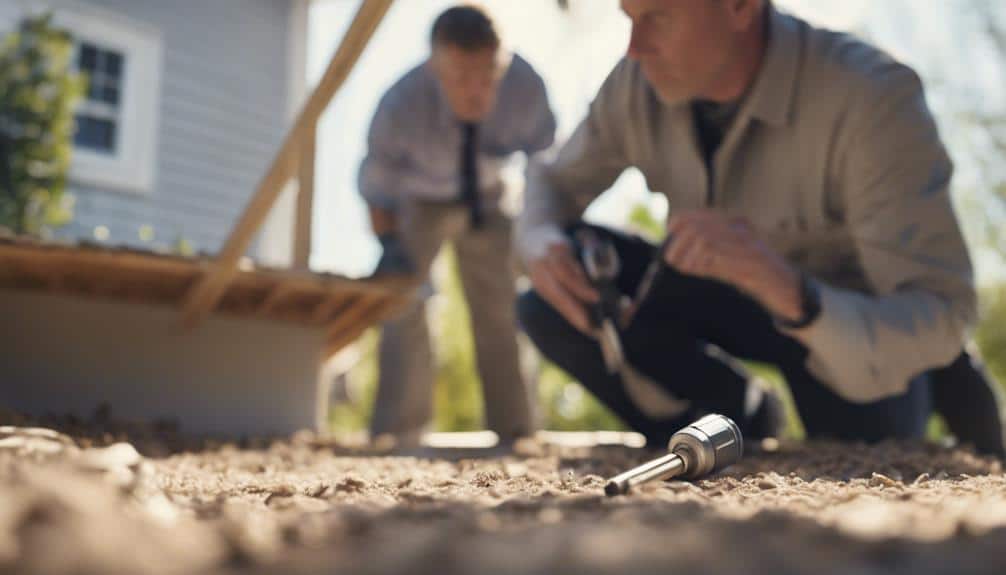Key Takeaways
- Calculate your total monthly income and ensure a robust emergency fund is established.
- Assess all homeownership costs, including property taxes, insurance, and maintenance expenses.
- Choose a location that considers property value, commute, amenities, and local school ratings.
- Evaluate the home’s convenience, efficiency, and suitability for your lifestyle and future needs.
- Understand and plan for closing costs, negotiate effectively, and prepare for post-purchase financial management.
Assessing Your Financial Health
Before purchasing a home, you must meticulously evaluate your financial health, starting with a thorough calculation of your total monthly income from varied sources. This includes all salaries, bonuses, and any potential returns from investments. A robust understanding of your income is critical as it sets the groundwork for evaluating other financial commitments and readiness.
Next, scrutinize your savings to ensure you have a substantial emergency fund. This fund is vital for covering unexpected expenses without disturbing the financial ecosystem, which is necessary for home maintenance and other responsibilities. Additionally, examine your outstanding debts and credit score. Your credit score is a pivotal factor that lenders consider, affecting loan eligibility and interest rates. Understanding your debt levels helps calculate your debt-to-income ratio, a key indicator of your ability to effectively manage and sustain mortgage payments.
Furthermore, remember to consider additional costs beyond the mortgage while considering your capacity to afford a home. These include property taxes, insurance, and regular maintenance expenses. Each of these elements is integral in painting a detailed picture of your financial health, guiding your decision-making process in the homebuying journey.
Understanding Homeownership Costs
Understanding the full spectrum of homeownership costs is essential for any potential buyer. These costs include mortgage and property taxes, homeowners insurance, utilities, and ongoing maintenance expenses. Budgeting effectively to sustain long-term homeownership without financial strain is critical.
Here are the critical components of homeownership costs:
- Property Taxes: Charged by local government, these are based on the assessed value of your home. They fund community resources and infrastructure, making it essential to understand these costs as they vary significantly by location and property value.
- Homeowners Insurance covers property damage and liability issues. Choosing a policy is not just about picking one; it is also about understanding what it covers, how claims are handled, and how premiums may change over time.
- Utilities: Monthly expenses for water, electricity, gas, and trash removal can add up. These costs are recurrent and can fluctuate with usage and changes in service rates.
- Maintenance Expenses: Budgeting for regular upkeep is crucial to preserving your home’s value. Whether fixing a leaky roof or updating heating systems, these expenses help avoid more considerable costs.
Choosing the Right Location

Having explored the total costs of homeownership, it is equally important to focus on selecting an ideal location, as this choice dramatically influences both the quality of life and the financial future of your investment. The right location impacts numerous factors, including property value, commute time to work, accessibility to public transportation, and the quality of neighborhood amenities such as parks, shops, and restaurants.
Safety is paramount, necessitating a thorough investigation into local crime rates. The presence of quality educational institutions is also critical, as school ratings can markedly affect property value and appeal to future buyers. Additionally, understanding the future development plans can provide insights into the long-term appreciation potential of your property.
Evaluating a location’s location is advisable, considering how desirable it might remain in the coming years. Consulting with a knowledgeable real estate agent can be invaluable in this process. They can offer personalized advice based on your needs and preferences, guiding you toward areas that balance lifestyle benefits with solid investment prospects. This strategic approach ensures that your decision is both rational and financially sound.
Evaluating Home Features and Condition
When evaluating a potential home purchase, it is crucial to thoroughly examine the property condition to confirm it aligns with your long-term needs and lifestyle preferences. The journey into property ownership demands a detailed examination of various aspects that could impact your satisfaction and comfort. Here are critical factors to ponder:
- Layout and Size: Ensure that the home’s layout supports your daily activities and that the square footage meets your needs without compromising functionality or future flexibility.
- Energy Efficiency and Condition: Inspect the property’s systems and windows to evaluate energy efficiency. This will not only affect utility costs but also contribute to environmental conservation.
- Outdoor Space and Parking: If you enjoy hosting or have multiple vehicles, check the adequacy of outdoor spaces and parking options. Consider any restrictions imposed by historical district regulations that might limit property aesthetics or structure changes.
- Potential Red Flags: Be observant of signs of foundational issues, poor artistry in tiling or flooring, and any regulations specific to the area that could influence your living experience or future property modifications.
Making informed decisions based on these assessments will guide you toward a more secure and satisfying homeownership.
The Importance of Home Inspections

While evaluating a layout and energy efficiency is valuable, conducting a thorough home inspection is equally imperative to uncover any underlying issues. Home inspections are pivotal as they deeply investigate the property, revealing hidden problems that might not be immediately apparent. They assess the structural integrity, electrical systems, plumbing, and HVAC—crucial aspects determining the home’s safety.
Moreover, attending the inspection provides a unique opportunity to ask questions and obtain firsthand insights that can influence your purchase decision. This engagement can help you gauge the extent of costly repairs and maintenance needed, enabling you to decide whether the investment is sound or if negotiating a better deal is possible.
Below is a summary of key areas covered during home inspections:
| Area Checked | Importance | Potential Impact on Purchase |
|---|---|---|
| Structural Integrity | Ensures safety | Major repairs can be costly |
| Electrical Systems | Prevents hazards | Essential for functionality |
| Plumbing and HVAC | Ensures comfort and efficiency | Immediate maintenance might be needed |
Home inspections are an indispensable part of the home-buying process. They ensure you step into homeownership confidently and fully aware of your investment.
Navigating the Buying Process
Exploring the home buying process demands a thorough understanding of its stages, from initial search to final closing, to guarantee a successful acquisition. As a prospective homeowner, especially if you are a first-time homebuyer, maneuvering this journey requires meticulous financial and strategic planning. The following steps are imperative:
- Assemble Your Team: Build a robust team comprising a real estate agent, a mortgage lender, and a home inspector. These professionals provide essential guidance, from understanding the real estate market to conducting thorough home inspections.
- Secure Mortgage Pre-approval: Before delving into the property search, obtaining a pre-approval is essential. This not only clarifies your budget but also enhances your credibility with sellers. A good credit score can secure favorable terms, potentially reducing monthly mortgage payments.
- Conduct a Detailed Search: Spend 30 to 60 days exploring available properties. Your real estate agent can offer invaluable insights into market trends and help you find a home that fits your needs and financial constraints.
- Understand Financial Implications: Be aware of all costs involved, including potential closing costs and the implications of different mortgage options on your financial health. This foresight helps in planning sustainable monthly mortgage payments without overstretching your budget.
Closing and Negotiation Strategies

As we shift into the critical aspects of closing and negotiation strategies when purchasing a home, it is crucial to grasp the nuances of closing costs, which can significantly impact your financial planning. Employing effective negotiation tactics not only positions you to reduce these expenses but also enhances the terms and conditions of your purchase, potentially including beneficial seller concessions. Additionally, the importance of the final walkthrough cannot be overstated, as it ensures the properties are agreed upon before finalizing the transaction, safeguarding your investment.
Understanding Closing Costs
Understanding closing costs, which typically range from 2-5% of the loan amount, is essential for any homebuyer aiming to manage their financial responsibilities effectively during the purchase process. These costs are crucial in real estate, where every detail in the breakdown can impact your out-of-pocket expenses. HeHere’shat HeHere’souldnow:
- Services Included: Fees cover essential services like appraisal, title search, and attorney fees.
- Negotiation Leverage: Experienced real estate agents can negotiate with sellers to cover some or all closing costs.
- Preventing Surprises: Knowing the detailed breakdown beforehand avoids unexpected costs.
- Financial Planning: Helps in better financial planning and reduces home buying stress.
Understanding these elements ensures a smoother transaction and keeps surprises at bay.
Effective Negotiation Tactics
Effective negotiation tactics are essential for securing the best possible terms when purchasing a home. Leveraging market research, you can understand property values and gain negotiation power. Always consult a property expert whose expertise can effectively guide you through the closing process.
| Strategy | Purpose | Outcome |
|---|---|---|
| Set a maximum budget | Control spending | Avoid overpaying |
| Include contingencies | Protect interests | Safe transaction |
| Use appraisal clause | Verify property value | Fair price assurance |
| Inspection clause | Assess property condition | Informed decision-making |
Be prepared to walk away if terms are unfavorable, maintaining your leverage and ensuring a positive outcome. This approach empowers buyers to negotiate confidently and successfully.
Final Walkthrough Importance
The final walkthrough is vital in homebuying, ensuring all agreed-upon conditions are met before closing. This essential step allows the buyer to assess the property’s condition carefully, confirming that it matches the contract terms. Here’s what to focus on:
- Verify Repairs: Ensure all requested repairs are completed per the agreement.
- Check for New Issues: Identify any discrepancies that might have arisen since the last inspection.
- Review Documents: Bring your contract and inspection report to cross-reference against the current state of the property.
- Negotiation Leverage: Use findings from the walkthrough to negotiate repairs or adjustments before finalizing the purchase.
A detailed final walkthrough is pivotal to a successful home purchase.
Post-Purchase Considerations

Securing your financial stability after purchasing a home involves establishing an emergency fund to manage unforeseen expenses efficiently. This critical step is essential for coping with unexpected repairs and ensuring regular maintenance is not a financial burden. Regular upkeep and timely interventions preserve the value of your home and prevent the escalation of minor issues into costly problems.
Moreover, understanding the complexities of the home buying process enables you to make informed decisions that enhance your financial security. Viewing your monthly homebuying as a debt and investment in your future stability is vital, potentially serving as a retirement fund. However, relying solely on your home’s retirement funding can be risky. Diversifying your savings and securing a retirement fund is advisable to safeguard your long-term financial health.
The journey to homeownership doesn’t end. It’s a continuing learning, investing, and planning process. Educating yourself and preparing for all home expenses ensures your investment is protected and grows, contributing positively to your overall financial well-being.
Frequently Asked Questions
What Things Should You Consider Before Buying a Home?
Before purchasing a house, contemplate your budget, location preferences, property requirements, and energy efficiency features to guarantee long-term satisfaction and financial stability in your housing choice.
What 3 Requirements Should You Meet Before You Consider Buying a Home?
Before contemplating homeownership, guarantee stable employment and income, uphold a strong credit score for favorable mortgage terms, and accumulate enough savings for a significant down payment and other related homeownership costs.
What Is the First Step You Should Take When Considering Buying a Home?
The first step in considering a home purchase is evaluating financial readiness. This involves analyzing your budget, understanding loan eligibility through credit scores, and securing mortgage pre-approval to determine your purchasing capacity.
What Are the 5 Phases of Buying a Home?
The five phases of buying a home include preparation, building a team, home search, contract to close, and post-purchase activities, each critical for a successful acquisition and shift into homeownership.
Essential Points to RememberConclusion
To sum up, beginning the journey to homeownership requires a thorough evaluation of one’sfinancial landscape and a deep understanding of the associated costs. Selecting an ideal location and assessing the home’s condition is essential, much like pieces fitting seamlessly into a puzzle. Skillful navigation through the buying and closing processes, followed by strategic post-purchase planning, guarantees the investment matures, fostering stability and growth in the private life.






